Too many tabs, too many apps, too many notifications. If your brain feels scrambled after just an hour online, you’re not alone. This post breaks down the emotional toll of digital clutter and shows how to gently reset.
Ever Felt Like You’re Drowning in Open Tabs?
I once counted I had 42 tabs open.
That’s not a metaphor. Literally 42.
I wasn’t even reading half of them. Just… couldn’t close them. Felt like I *might* need them later.
That day, I forgot what I was searching for. And weirdly, I felt sad. Like something got lost in the noise.
Ever feel like your brain’s a jumbled mess after hours online? That’s digital clutter at work those endless notifications, overflowing inboxes, and apps you forgot you even had. It’s not just your phone slowing down; it’s your mind too. This article dives into what digital clutter is, why it overwhelms you, and how to clean it up to reclaim your focus. With real stories and practical tips, you’ll learn how to tame the chaos and feel lighter. Ready to clear the digital fog? Let’s do this! 😊
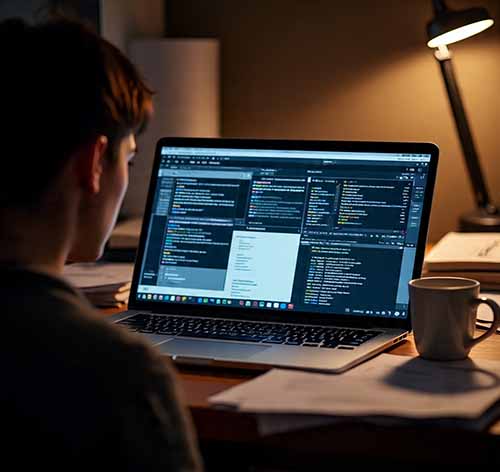
What Is Digital Clutter (And Why It Feels So Heavy)
Digital clutter isn’t just files or emails. It’s the emotional noise of:
– Unread messages that feel like guilt
– Endless bookmarks you’ll “totally read later”
– Social feeds that never really end
It’s invisible but your brain tracks it all. That’s why you feel tired without moving. Picture this: you’re trying to find a file on your laptop, but your desktop’s a total disaster icons everywhere, half of ‘em you don’t even recognize. Your phone’s buzzing with notifications from apps you haven’t opened in months. And your email? Oh man, 20,000 unread messages staring at you. That’s digital clutter, and it’s like a messy room, but for your brain.
Digital clutter is all the extra stuff piling up on your devices unnecessary files, apps, emails, and notifications that make your digital life feel chaotic. It’s not just about storage space; it’s about mental space too. Think duplicate photos, old PDFs you’ll never read, or that app you downloaded for a one-time thing. It’s sneaky ‘cause you don’t see it like physical clutter, but it’s just as stressful
I had a friend, Sam, who’s non-binary and super active in online queer communities. They’d save every post, every meme, every article, thinking, “I’ll need this for advocacy later.” But their phone was so full, it kept crashing, and they’d get stressed just opening their gallery. That’s digital clutter hitting hard especially when you’re juggling identity and activism online.
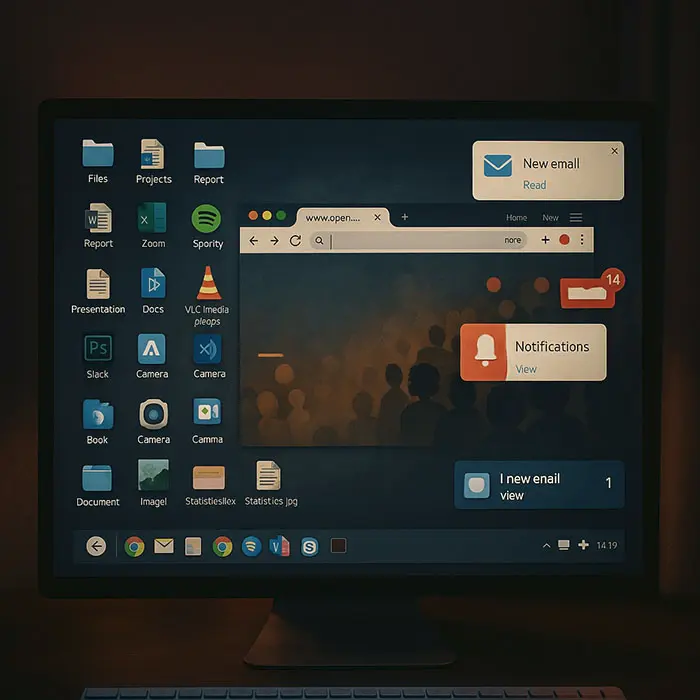
The Day My Brain Froze (And My WiFi Was Fine)
I wasn’t doing anything hard. Just toggling between tabs, replying to DMs, half-reading an article.
But suddenly, I couldn’t remember what I was trying to do.
My head felt foggy. Like someone had poured syrup on my brain.
I shut the laptop. Sat in silence. And cried out of frustration.
After that, I started setting a digital “end time.” No screens after 9:30. I was grumpy about it. But after a week? My head was *clearer.* Still noisy… but clearer.
This felt similar to what I wrote in my post about overthinking at night. But here, the overload wasn’t emotional it was digital. Same fog. Different source.
Why Does It Make Your Brain Feel Messy?
Ever wonder why you feel so frazzled after scrolling X or checking emails? Digital clutter’s to blame. Our brains love order, but when your digital space is a mess, it’s like trying to think in a room full of screaming toddlers. Research from Northumbria University says digital clutter can spike stress and anxiety, just like physical clutter (NY Times). It’s ‘cause your brain’s trying to process all those notifications, files, and apps at once.
It’s worse than you think. Constant pings from your phone? They’re hijacking your focus. A messy desktop? It’s making you waste time looking for stuff.
And all that mental noise can even mess with your sleep ever stayed up late ‘cause your phone wouldn’t stop buzzing? I did that once, stayed up till 2 a.m. scrolling through notifications, and felt like a zombie the next day.
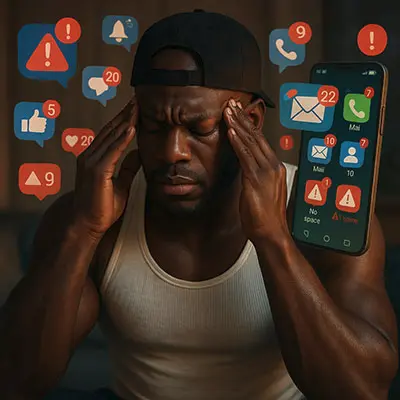
🟦 Self-Care and Digital Minimalism
For folks in the LGBTQ+ community, digital clutter can feel extra heavy. Online spaces are often where you connect, find support, or express yourself, but saving every post or joining every group can turn your digital life into a stress fest. It’s like carrying a backpack full of digital bricks.
How I Made Space (Without Going Off-Grid)
– I pick 3 tabs max. The rest go in a “Later” folder.
– Email? Twice a day, max. That’s it.
– I use physical Post-its. My brain likes paper.
– No social media in bed. Ever.
– On Sundays, I delete apps I didn’t use that week.
This isn’t minimalist magic. It’s just… air.
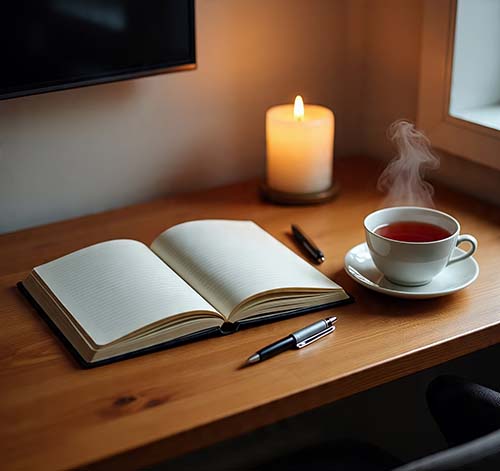
What Causes Digital Hoarding?
Why do we let digital clutter pile up? It’s not just laziness there’s psychology behind it. Here’s what’s going on:
- Fear of losing stuff: You keep old files or photos ‘cause you’re scared you might need ‘em someday.
- Emotional attachment: That blurry selfie from 2018? You can’t delete it ‘cause it’s got memories.
- No organization: Without a system, files and apps just pile up, and it’s easier to ignore than fix.
- Cloud complacency: With tons of storage, you think, “Why bother deleting?” (BBC).
- Habit: We’re trained to save everything, from emails to screenshots, without thinking.
I’m guilty of this. I used to save every email from my boss, thinking I’d need proof of something. Spoiler: I never did, but my inbox was a nightmare. Digital hoarding’s like keeping a closet full of clothes you’ll never wear it’s comforting, but it’s weighing you down.
Clarity Isn’t a Productivity Hack. It’s Survival.
If your head feels full, you don’t need more willpower. You need less input.
You’re not weak for needing silence.
Digital clutter is real. And it steals the quiet parts of you.
Make room. Not for perfection just for breath.
How to Tackle Digital Clutter
Good news you can clean this up! Here’s how to start:
- Delete unused apps: If you haven’t opened it in a month, it’s gotta go.
- Organize files: Make folders with clear names, like “Work 2025” or “Vacation Pics.”
- Tame notifications: Turn off non-essential alerts. Your brain doesn’t need to know every X like.
- Clean your inbox: Unsubscribe from junk emails and archive what you don’t need (The Minimalists).
- Back up smart: Save important stuff to a cloud or external drive, then delete duplicates.
- Set boundaries: Check emails or social media at set times, not all day.
I started doing a “digital cleanup” every Sunday 15 minutes of deleting old files and unsubscribing from newsletters. It’s like a mini therapy session for my brain. For more tips, check out our guide on Self-Care and Digital Minimalism.
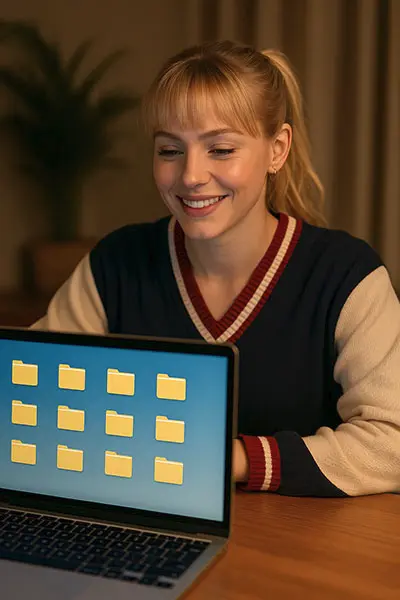
Conclusion
Digital clutter’s real, and it’s messing with your head more than you think. But you don’t have to live with it. By taking small steps to clean up your digital space, you’re giving your brain room to breathe and focus. Start with one thing maybe your inbox or those 50 browser tabs and see how much lighter you feel. You got this! 😊
Wanna dive deeper? Check out our Digital Overload Guide or try a digital detox with tips from Healthline.
Digital Clutter FAQ (Because You’re Not Alone)
It’s the pile-up of unnecessary files, apps, notifications, and subscriptions on your devices that stress you out and mess with your focus.
Think unread emails, unused apps, duplicate files, a messy desktop, or constant notifications from social media.
Totally! It can spike stress, make it hard to focus, and even mess with your sleep.
Fear of losing stuff, emotional attachment to files, lack of organization, or just having too much cloud storage.
Set rules for what to keep, delete regularly, organize files, and limit storage to force yourself to be picky.
Because your brain treats tabs and messages like unfinished business
Citations:
- The Zebra – Digital Clutter Statistics
Related Articles I Recommend Don’t Miss
Your brain doesn’t need more clutter give it some space. Start with one tiny clean-up today and notice how your mind breathes afterward. 🌿
✨ Last updated on 06.08.2025
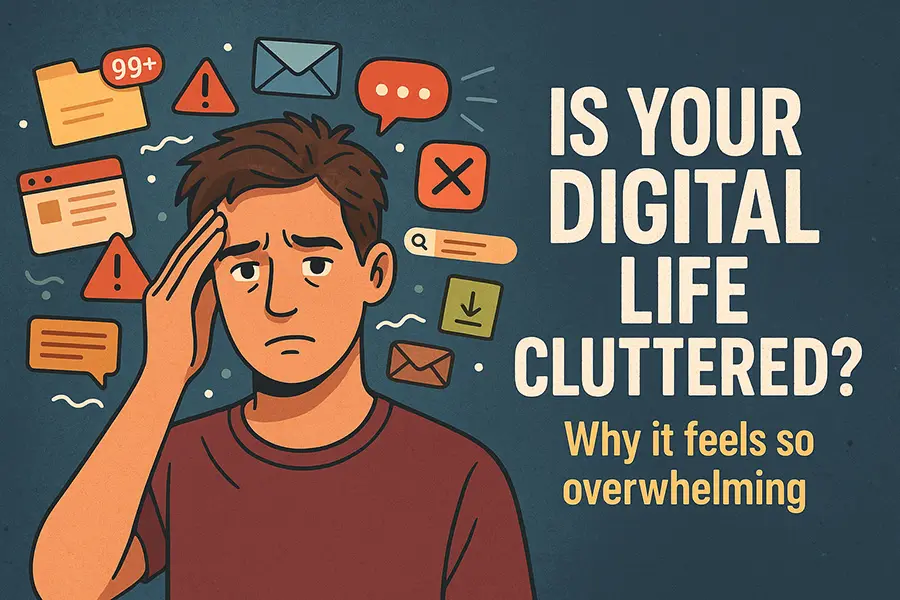




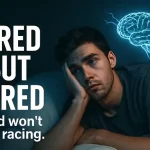





Leave a Reply